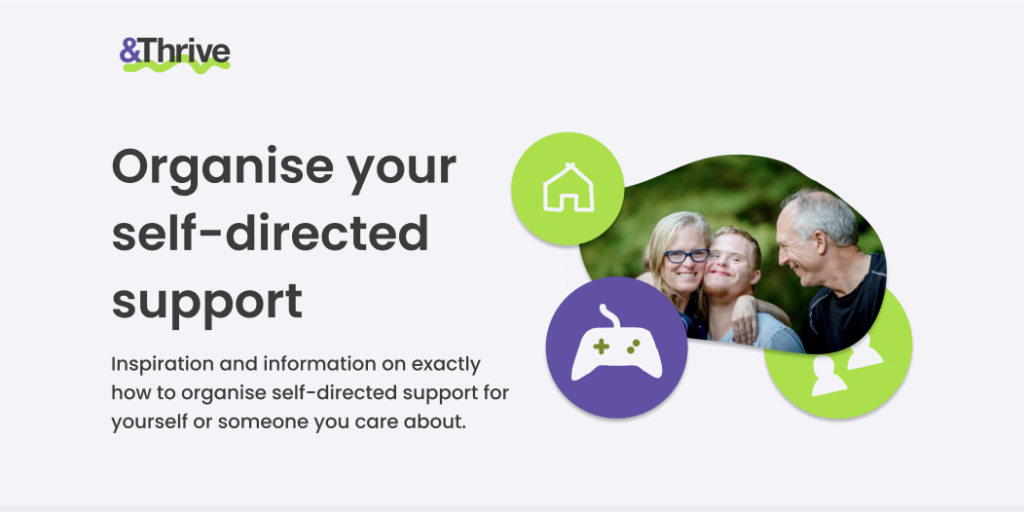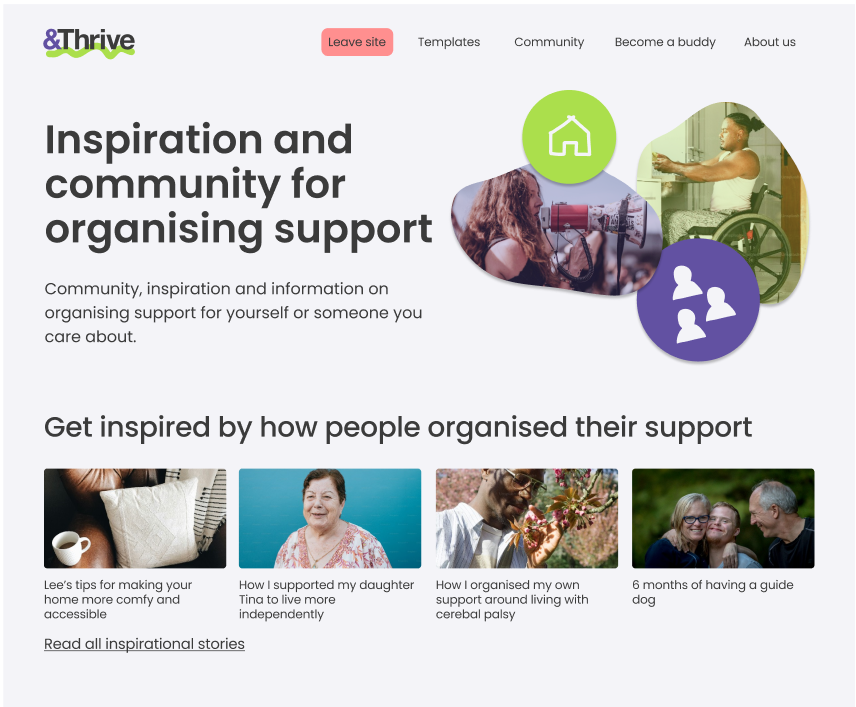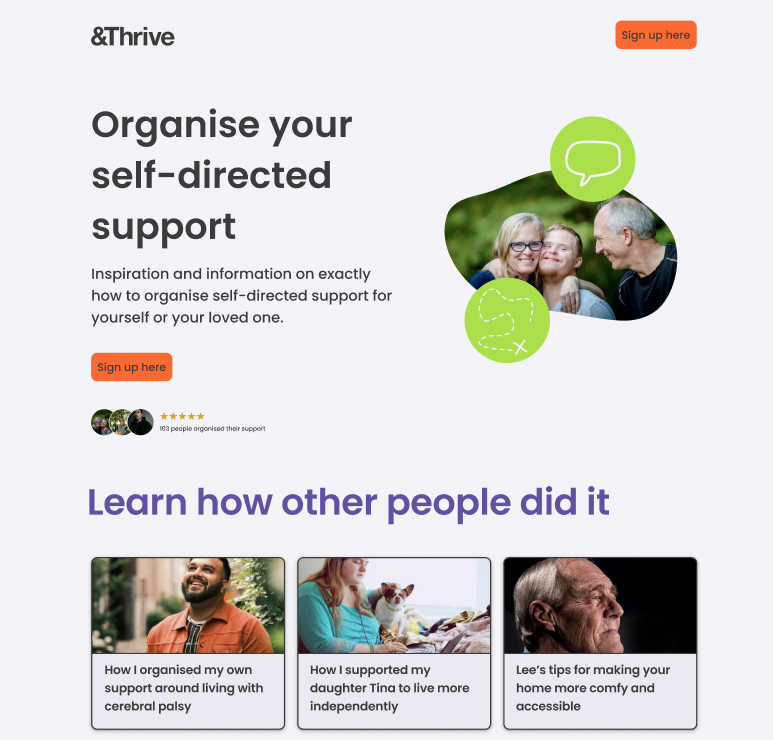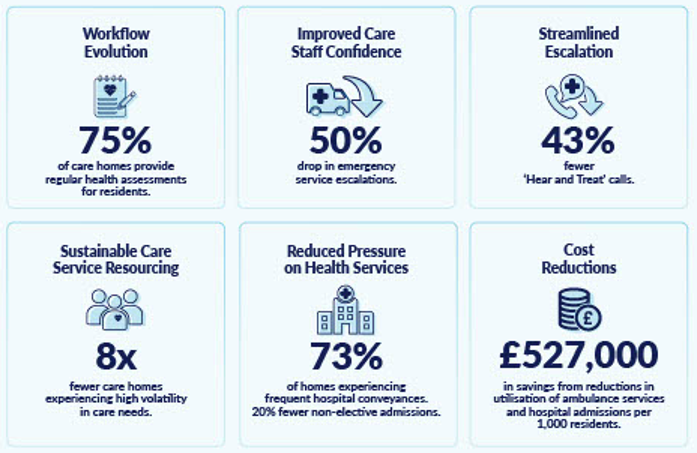Scaffolding choice and control – What We’ve Learned from &Thrive and How We Want to Take It Forward

Introducing &Thrive: A co-produced platform to help people confidently take control of their own care — and a blueprint for a more empowering future of self-directed support.
In co-production with people who draw on social care to live their lives, Care City and In Control have been developing ‘&Thrive’, an initiative to scaffold and strengthen people’s confidence, opportunity and capacity to successfully take control of their own care through self-directed support. Initially funded by The Health Foundation, co-design and iteration has helped us uncover barriers, opportunities, and new ways forward for making self-directed support more empowering, connected, and accessible.
We started with a simple belief: people should be in control of their own lives. We believe the future of social care should be about empowerment, not limitation. This is not just to the ends of ensuring the rights of disabled people, older people or family members arranging support, it’s equally about the future effectiveness and sustainability of our health and social care systems.
Too often, people who consider managing their own support face rigid systems, limited support, and a lack of information on what’s possible. &Thrive set out to change that, creating a platform for the sharing of ideas, inspiration and mutual support, to put more power into people’s hands.
Now, as the project reaches a turning point, we want to share everything we’ve learned, encourage others to build on our insights, and invite new collaborators to help take &Thrive to the next level.
What We Set Out to Do
Self-directed support should unlock possibilities, not limit them. But too often, people navigating the system told us that they:
- Feel disconnected and alone, unsure where to turn for advice.
- Don’t know what’s possible or permissible, with limited access to information.
- Encounter rigid and bureaucratic processes that make innovation difficult.
One person we spoke to summed it up perfectly:
“People who need care shouldn’t have to be experts in the system to get the right support.”
We couldn’t agree more. We wanted to change that.
Our vision for &Thrive is simple:
- A space where people can imagine new possibilities for their care.
- A platform that connects people with lived experience to share stories, solutions, and support.
- A tool that helps people plan and navigate their care options more easily.
And most importantly, we wanted &Thrive to be built with and for the people who need it most.

What We’ve Learned
Through research, co-design workshops, testing, and surveys, we’ve engaged 120+ individuals from across the UK and Ireland, ensuring diverse perspectives shape &Thrive. Here’s what we’ve discovered:
People Need Help Seeing What’s Possible
Many people aren’t aware of the full range of creative, flexible options available under self-directed support. Local authority guidance is often focused on rules and restrictions, rather than creative opportunities.
What we did:
- Created story-driven resources showcasing real-life examples of people using self-directed support in creative ways.
- Facilitated workshops and peer sessions where people could share experiences and learn from each other.
- Developed digital tools to help people navigate decision-making and explore new care possibilities.
“I thought self-directed support was just about getting a PA. I didn’t realise I could use it to access a dance class or a tech solution that helps me live more independently.”
What we learned: When people see examples of what’s possible, they feel more confident, in control and encouraged to be creative.
The Power of Peer Support
Managing your own support can feel lonely and overwhelming. People often struggle to find advice and feel like they’re navigating everything alone.
What we did:
- Built a peer support model, creating spaces where people managing their own support could connect, share and learn from each other.
- Tested a mentoring-style approach, pairing experienced individuals with those just starting out.
- Designed a community forum for shared learning and discussion.
- Piloted co-designed training resources to improve confidence.
“I had no idea what was possible until I spoke to someone who had been through it before.”
What we learned: People don’t just want services—they want connections, advice, shared experience and solidarity.

Technology can be an Enabler—If Used Right
Many people managing their own care don’t know where to find information, support, or useful digital tools. But technology has the potential to change that.
What we did:
- Mapped out the digital landscape, identifying what technology is already available and where the gaps are.
- Explored AI and digital solutions that could help people understand and access self-directed support more easily.
- Collaborated with people drawing on social care to ensure that technology solutions are designed with them, not just for them.
- Partnered with accessibility experts to ensure usability if &Thrive platform for all.
Read more in Neil Crowther’s blog Technology for Better Self-Directed Support about how technology can improve self-directed support.
“Technology shouldn’t replace human support, but it can make life so much easier if it’s done right.”
What we learned: Digital tools must be built with the intended end users—ensuring accessibility, simplicity, and real-world relevance.
Our Vision for the Future of &Thrive
We have ambitions and plans to take &Thrive further, to build a sustainable, community-driven model that continues to grow and evolve. The building blocks already in place include:
A co-produced, evidence-based prototype
Supported through the first phases of the Health Foundation’s Tech for Better Care programme, we have, through design and co-production, developed a low-fidelity clickable prototype that shows how we imagine the platform might work. We have thought hard about the Minimum Viable Product, and we are ready to move into this next phase immediately.
A unique partnership
Care City is an innovation centre for health, social care and regeneration, based in East London but working nationally, with particular expertise in design and technology. In Control is the leading organisation promoting and supporting self-directed support and personalised care in England. The &Thrive co-design group involves people whose expertise is rooted in lived experience of directing support for themselves or their families.
With further support we’re keen to:
Continue Co-Production & Community Building – Continue working with our co-design group to refine the platform. Lived experience stories will be a key feature, ensuring that &Thrive is rooted in real-world examples.
Develop a Thriving Online Community – &Thrive has the potential to be more than just a platform—it’s a movement. We’d like to launch a peer support forum with a community manager who has lived experience and hosting community-led events to connect and inspire users.
Ensure Accessibility & Testing – Make sure &Thrive works for everyone, conducting regular usability testing, including with screen-reader users and make iterative improvements, based on direct user feedback.
Expand Training & Professional Development – We’d develop apprenticeship-level training for people managing support—ensuring that skills, knowledge, and leadership opportunities grow within communities.
Influence Policy & Scale Impact – &Thrive has the potential to inform local and national policy. We’d work with councils and health partners to:
- Help local authorities meet their Care Act 2014 obligations.
- Align with the Social Care White Paper vision for greater independence.
- Demonstrate cost savings while improving people’s quality of life.

We’re keen to share our learnings and our project assets.
View our &Thrive Service Blueprint
There’s much, much more to share. Get in touch if you’re interested in collaborating, learning from our work, or helping bring &Thrive to life in new ways. Let’s create a future where people have the confidence, freedom, and opportunity to shape the care they need.



